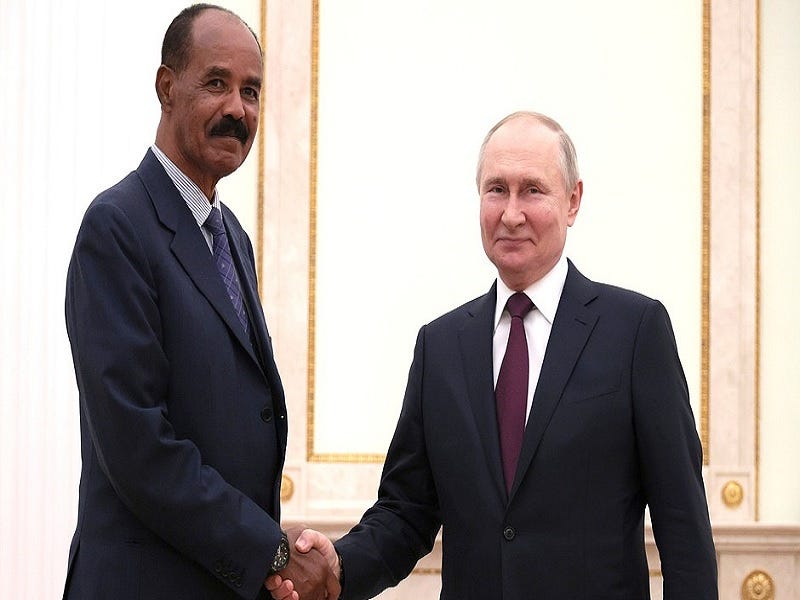Date: Friday, 02 June 2023

President Afwerki was right about International Relations all along and he’s finally seeing his vision of a fairer world order enter into fruition, which is why he deserves appreciation from everyone.
Eritrean President Isaias Afwerki just paid his first-ever visit to Russia since the establishment of bilateral relations three decades ago, which follows Russian Foreign Minister Sergey Lavrov’s trip to this Horn of Africa country in late January. That visit was also the first in their history and was analyzed here at the time. It was importantly noted that Eritrea was a multipolar pioneer even before Russia assumed the role over the past 15 months of leading the global systemic transition in this direction.
Few are aware of this fact, but it’s a point of pride for the Eritrean people, who deeply respect their leader for consistently remaining committed to his vision of a fairer world order. President Afwerki took the opportunity during his meet with President Putin to politely remind his counterpart of this too as proven by the official Kremlin transcript of the talks that were held before their meeting. Here’s what he said:
“The Russian Federation was the primary competitor and rival of the policy of encirclement and containment by the forces of domination from the early 1990s, and its global impact in the past 30 years was considerable indeed. The Russian Federation, too, did not undertake, at the outset, all the necessary preparations for effective resistance. An integrated and comprehensive strategy of resistance was not accordingly set in motion.”
President Afwerki shared this insight while concisely reviewing the evolution of International Relations since the end of the Old Cold War. The other points that he made are all relevant as well, but most observers are probably already aware of them since they’ve since been reflected in official Russian statements after Moscow assumed the role of leading the global systemic transition to multipolarity. Nevertheless, everyone should know that the Eritrean leader was the first one to express these views.
For those who aren’t familiar with his biography, President Afwerki is a lifelong revolutionary who led his country to independence from Ethiopia after a three-decade-long struggle. Unlike most of his peers across the Global South, he never betrayed his ideals after the dissolution of the USSR. In fact, it’s precisely for this reason that Eritrea was framed by the Mainstream Media as a so-called “rogue state”. It was even sanctioned by the UNSC for nearly a decade from 2009-2018 too.
At the time, Russia had yet to realize that the West was manipulating it into dropping its strategic guard through the Obama-era “reset” and former German Chancellor Merkel’s outreaches, which resulted in policymakers falsely concluding that the West didn’t pose an existential threat to their country. President Putin has since acknowledged this error of judgement and radically recalibrated his country’s grand strategy, but President Afwerki never had to do this since his policy has always remained the same.
Eritrea and Russia are two completely different countries that found themselves in totally dissimilar situations after the end of the Old Cold War, with the first being a tiny war-raved state led by a bonafide revolutionary while the second was a comparatively stable giant led by a pro-Western liberal-globalist. These initial conditions are responsible for their diverging trajectories in International Relations that only converged after Russia radically recalibrated its own over the past 15 months.
To be sure, President Putin was gradually changing his country’s trajectory even prior to the start of its special operation as was explained here and here, though it wasn’t with any revolutionary intent. Rather, he envisaged Russia functioning as a bridge between China and the EU, which he predicted would imbue his country with the potential to become the supreme balancing force in Eurasia. In pursuit of this grand strategic goal, he sought to retain close ties with the EU while reaching a rapprochement with the US.
He obviously didn’t succeed, but his intentions were sincere and everything made sense from his perspective at the time. The only reason why Russia never ended up playing the role that President Putin foresaw was because the US calculated that it’s better to contain his country than to cooperate with it. This assessment is attributable to the influence that its ruling liberal-globalists’ ideology plays in the formulation of their policy, which the Russian leader didn’t recognize until it was too late.
Whereas President Afwerki has always operated as a revolutionary, President Putin has always operated as a pragmatist, which led to him subconsciously projecting his management style onto the West. Had he understood the ideological drivers behind that de facto New Cold War bloc’s policies like his Eritrean counterpart did, which President Afwerki also described during their meeting, then he might have launched his special operation earlier like Belarusian President Lukashenko recently lamented.
The past can’t be undone but the future can still be built, which is what Presidents Afwerki and Putin discussed during the former’s first-ever visit to Russia. This isn’t wishful thinking either since it’s confirmed by the official Kremlin transcript of their meeting, which notes that the Eritrean leader concluded his remarks by saying that “There is hope and conviction that the Russian Federation will play its appropriate role in this mission of humanity in solidarity and cooperation with the free peoples.”